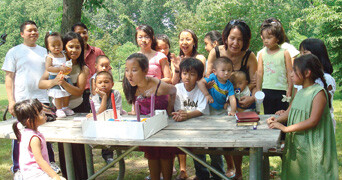
Area church reacts to cyclone
BY LINDA WORTHINGTON
UMCONNECTION STAFF
When cyclone Nargis struck the Irrawaddy Delta in Myanmar (Burma) May 2, the Mizo United Methodist Fellowship in Rockville was quick to respond with prayers and financial support.
 The Rev. Biak Chhunga is pastor of the United Methodist congregation that meets Sunday afternoons at Faith UMC in Rockville.
The Rev. Biak Chhunga is pastor of the United Methodist congregation that meets Sunday afternoons at Faith UMC in Rockville.
Those with family in Yangon (Rangoon) learned that roofs had been blown off, water flooded the homes and huge trees fell on property. Almost everyone had loved ones who were affected.
The Rev. Martin Lalthangliana, a church member's brother, is mission director for the Lutheran Church of Myanmar.
"Our office and apartment are damaged. For some time, we don't know how to settle these things and don't know how to cope with the situation we are facing. It's still a nightmare for us," he said in an e-mail.
"But now our church is focusing on helping the people in the delta region who need help more than us," he continued. "Two weeks ago, we went to two villages ... about 200 miles from Yangon. We've helped 100 families with clothes, blankets, mosquito nets, tarpaulins, candles, rice and oil. In these two villages, about 200 people are dead.
"We also met with people who survive from the cyclone but not their family members," Lalthangliana reported. "They've got many stories about their survival and how they tried their best to help their wives and children but failed. It's a tragedy."
When the Mizo congregation sent $1,500 to the cyclone victims, Chhunga said, they used David Vunga as an agent.
Vunga is the pastor of the Evangelical Church of Myanmar in Washington, D.C. who makes regular trips to Myanmar.
"One of the biggest needs is for clean water," Chhunga said. "We sent $300 with him for three wells so the people can have clean water."
Many of the 60 people attending the Mizo United Methodist Fellowship first came to the United States as refugees from poverty and political oppression.
Chhunga came to this country in 1990 to further his studies and completed a Doctor of Ministry degree from Pittsburgh Seminary.
He began the Mizo congregation in 2003 with about 15 people. The fellowship was accepted as a new church initiative in the Baltimore-Washington Conference a year later.
Today the congregation has about 50 regular Mizo-speaking people. Their original homes were in Mizoram, "the land of the Mizo," an area of eastern India that crosses the border into western Myanmar.
The church is growing more slowly today, Chhunga said, because most members are refugees, and the United States is not accepting many Mizo refugees. Instead, they flee to Malaysia, Thailand or Australia.
Chhunga's ministry to his congre-gation and Mizo community includes accompanying new refugees on thearduous task of getting and filing the paperwork required by the U.S. government.
He spends many mornings in Silver Spring offices with bewildered newcomers in this assistance ministry. He also works full-time afternoons and evenings as a counselor with people in early stages of dementia for Adventist Health Care.
The Mizo ethnic group is a sub-group of the Chin people who, with the Karen ethnic group, make up the largest part of the country known as Burma until the current regime changed the name to Myanmar a few years ago.
Most of the cyclone victims in the Irrawaddy Delta, some 133,000 who have now died as a result of the cyclone, are Karen Christians.
Aid agencies, the U.S. government and the United Nations have been frustrated by the Myanmar government's refusal to allow food, water and needed supplies to enter the country. "Many believe this is a form of ethnic-cleansing," Chhunga said. "Christians have a long history of fighting against the government, so the government is saying, ‘Ignore them. Let them die.'"
Chhunga and his congregation refer to the country as Burma, but have had some difficulties in doing so.
Recently he took a package to the local post office to mail to his relatives and addressed it "Burma." Because the people in the post office couldn't find the name Burma on their list of countries, they refused the package. He had to readdress it.
The Mizo people are virtually all Christian, a minority in the Buddhist country.
"My Mizo people received the Gospel from India in 1894," Chhunga said. At the time, "my people were very backward and practiced headhunting."
Some of them killed a British plantation owner and captured his daughter, Mary Winchester. The British military reacted with their superior strength, subduing the Mizo and rescuing Winchester. They shared the story with missionaries in England and soon Mizoram became a fertile mission field.
"It's a sad story but shows how God prepares for his Word," Chhunga said. "Within 60 years, all Mizo were Christian. "We're all Christian, no Hindu, Buddhist or animists."
The congregation, one of five or six Mizo congregations in the Washington metropolitan area,
practice the teachings of John Wesley," Chhunga said. "We ask members each gathering ‘How is your scriptural situation? What obstacles do you have to overcome?'"
To learn more about the Mizo community and church, see www.Mizomethodist.org.
Contributions to cyclone relief work can be made through the United Methodist Committee on Relief (UMCOR). Checks should be marked "Myanmar Emergency UMCOR Advance #3019674." For more information, see http://new.gbgm-umc.org/umcor.

Login/Register to leave comment